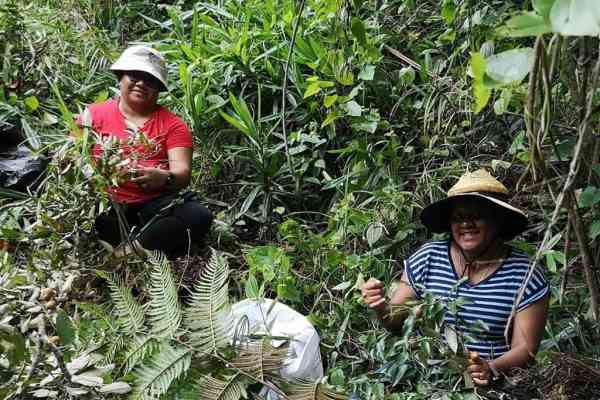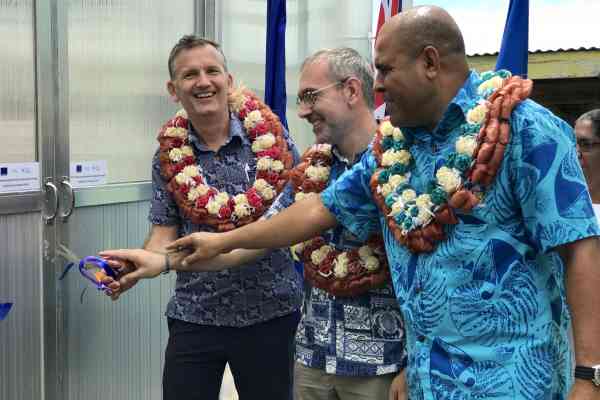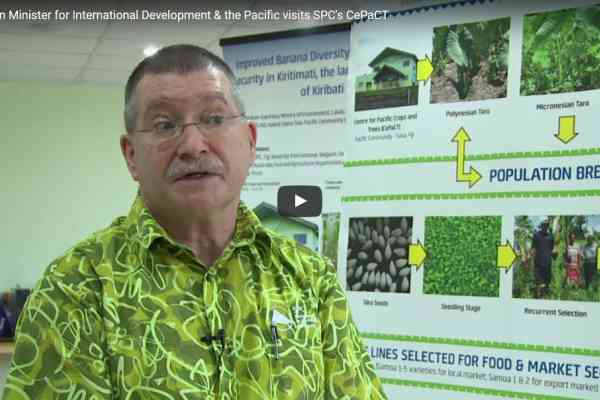(article disponible en anglais uniquement)
Responding to food and nutritional security, Meet Ulamila Lutu, Research Technician CePaCT, LRD
Ulamila Lutu is a Research Technician at the Pacific Community's Centre for Pacific Crops and Trees (CePaCT), formerly known as the Regional Germplasm Centre. It’s a lab facility that maintains, tests and distributes crop varieties and is operated by the Pacific Community's Land Resources Division. Its purpose is to preserve resources including crops, and trees of the Pacific region and international partners. Ulamila discusses at length her role at CePaCT.
Tell us about yourself and your work?
I am Ulamila Lutu, from Nagigi Village in Savusavu, Fiji. I am a research technician and assist the curator in managing the work carried out in the lab. So, a curator of the lab is like that of a librarian who looks after books, in our case, it’s looking after the plants stored at CePaCT.
CePaCT currently holds 17 crops with 2,230 varieties in total - crops not only from around the Pacific but also from Asia, Africa, Europe and the Americas. These are quite important crops which we nurture, conserve and distribute to member countries and international partners upon request.
These crops support countries with their food and nutritional security especially at a time when we are facing climate change and spread of pests and diseases.
How does your work impact the people at the grassroot level?
The work on crop conservation was started mainly after the Taro Leaf Blight epidemic that hit Samoa in 1993. It caused extreme devastation on the island. This prompted leaders from the Pacific Island Countries and Territories to conserve the Pacific crop diversity in a facility like CePaCT. One of the impacts of our work was coming up with new crop varieties through collaboration with our Pacific counterparts to breed crops that are resistant to plant pathogens. We also repatriated crop varieties that member countries have lost; for example, Niue, lost a certain taro variety and we were able to send it across to them.
We send across crops that mature faster, have good eating quality and have high nutritional value. We also have crops that are tolerant to climatic conditions such as droughts, high salinity, swampy conditions and pests and diseases.
Considering the COVID-19 pandemic, we received a lot of requests from member countries and international partners, we have a very big list right now and a timeline to hit it all as soon as the borders open.
What were some of the challenges that you had to overcome?
When I first started, the research on cryopreservation (the process of cooling and storing cells, tissues, or organs at very low temperatures to maintain their viability) was basically new technology altogether. Luckily, there were skilled people in other countries, so I travelled across to learn this skill.
We have conservation in-field, but these plants are impacted by climatic conditions, pests and diseases, and you can only store certain amount of plants in each space. You have tissue culture which is a step up where you can store it in a controlled environment, so it’s away from any outside influence and it is stored in a small area but cryopreservation, is a step further up because you can store it for an indefinite period of time so there’s less labour put into this work. You also require less space because you’re using small plantlets with a growing tip which is about less than one millimetre in size so you can store it in a small vial kept in a big tank. You can keep as many plants as you want in that tank and that is another source of safety duplication. That’s something that is important right now and what I had to overcome is to get the results and contribute to the impact that CePaCT provides to the region and the world.
Another challenge or I call opportunity is to manage people. This has built my capacity and confidence. But to be in this work, you have to have the passion for it and the drive which is something that I quite enjoy.
Would you like to add anything else?
We have more women joining our field of work. In certain countries, women are on the frontline in agriculture. At CEPACT, we have more women than we have men so that’s something we’re trying to balance, but it doesn’t stop the fact that we need men to be there, that balance is important in the work that we do. We should never be content or comfortable in the position or qualification that we hold. Always strive to push yourself to achieve more in life while keeping a balance with your priorities to your family and to your faith in God.


